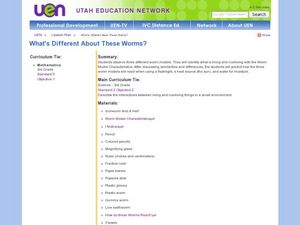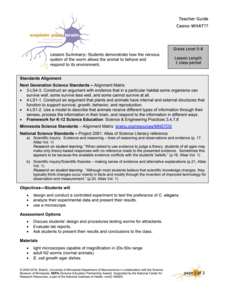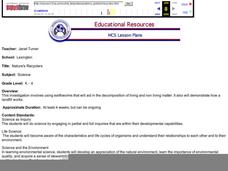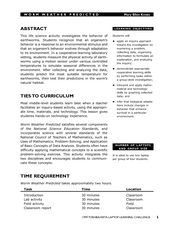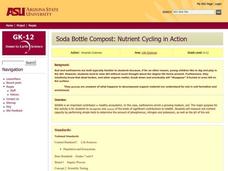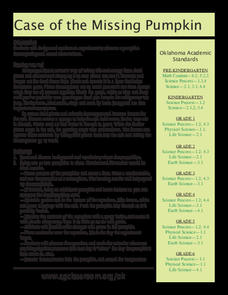Nuffield Foundation
Observing Earthworm Locomotion
One acre of land can contain more than a million earthworms. Scholars collect earthworms to observe their movements. Once placed on paper, the sound of movement often fascinates pupils. When placed on glass, the earthworm is unable to...
Curated OER
Meeting an Earthworm
Students inspect the anatomy of earthworms. In this earthworm lesson, students participate in a hands-on experiment as they analyze the structure of earthworms. Students demonstrate mastery through differentiated products. Lesson...
National Wildlife Federation
Soil Decomposers
The class studies the soil food web that includes earthworms and conduct four experiments using the crawly critters. Individuals determine whether earthworms are sensitive to light, touch, temperature, and acid.
Baylor College
Animals' Needs
Explore the wonderful world of earthworms as your class learns about the requirements of animal life. After building soda bottle terrariums, students observe worms over the course of a couple weeks, building an understanding that all...
Curated OER
Creeping and Crawling Observing Mealworms and Earthworms
Fifth graders observe mealworms and earthworms. In this mealworm and earthworm lesson, 5th graders complete an experiment in which they observe the life cycle and living conditions of mealworms and earthworms. They experiment with...
Curated OER
Earthworm Bridge
Fourth graders complete analysis experiments for decomposers and their adaptable traits. In this decomposers lesson, 4th graders test worm behavior to light, sound, warmth, touch, and moisture. Students work in groups to analyze the...
National Wildlife Federation
Soil Decomposers
Worms are the kings of the decomposers. A four-part lesson plan has learners experiment with the characteristics of earthworms and their sensitivities. They vary factors such as light, acidity, temperature, and touch of soil and observe...
Curated OER
Three Worm Lesson
Third graders observe properties of three worms. In this living and non-living activity, 3rd graders study characteristics of living and non-living worms. Students experiment to find how light, heat and moisture effects each of the...
Curated OER
What do Earthworms Like to Eat?
Students encounter three ecosystems for earth worms prior to performing an experiment. It will introduce students to one form of ecosystem as well as demonstrate how earthworms and the foods they eat affect the environment in which they...
Curated OER
Observation of a Living Earthworm
Sixth graders examine earthworms and their parts. For this earthworm lesson students complete a lab worksheet on the earthworm and test its response to certain factors.
Nuffield Foundation
Investigating the Effect of Temperature on the Activity of Lipase
How does temperature affect lipase activity? Young scholars conduct an experiment to collect data on the interaction of lipase at different temperatures. They add lipase to a solution of milk, sodium carbonate, and phenolphthalein and...
University of Minnesota
Caeno-WHAT??
Can you feel that? Can you smell that? Since pupils can't ask worms about their sense of smell and touch, they design and complete an experiment to answer these questions. Individuals expose nematodes to different stimuli using their...
Curated OER
Nature's Recyclers
Students create environments to demonstrate how earthworms interact with their surroundings.
Curated OER
Worm Weather Predicted
Students examine worm habitats. For this animal habitats lesson, students participate in a lab activity that requires them to explore the adaptations that earthworms make to their environment.
Curated OER
Soda Bottle Compost: Nutrient Cycling in Action
Students investigate, through their own experimentation, the important role wildlife play in nutrient cycling. Earthworms and compost are used in this experiment and different experimental setups be evaluated.
Curated OER
Dirty Decomposers
Learners explore the ecosystem by conducting a ziploc bag experiment. In this recycling lesson, students identify decomposer organisms in our environment and how they speed up the recycling process. Learners utilize a ziploc plastic bag,...
Curated OER
A Symphony of Decomposers
Students discover decomposition. In this environmental lesson, students explore different types of decomposers and their role within the ecosystem. Students also discover how waste interferes with the decomposition process.
California Academy of Science
What Would Happen?
Nothing says classroom fun like an invertebrate and a magnifying glass! Snails, earthworms, and roly-poly bugs become the center of attention as pint-sized investigators hone their inquiry and observation skills. They are guided through...
Curated OER
Case of the Missing Pumpkin
Scientists define and discuss decomposition, and watch pumpkins decompose and return to soil in classroom experiment. They record the date the experiment began, chart changes in pumpkins on a calendar, count how many days it takes...
Curated OER
Investigating What Makes Fruit Go Brown
Is there anything that can be done to slow the browning of fruit once it has been cut? High schoolers determine the answer through five different investigations involving apples, potatoes, and chemical reactions. After each experiment,...
Nuffield Foundation
Investigating Anti-Microbial Action
Join the fight against bacteria. An open investigation shows pupils different aspects of antimicrobial substances, such as disinfectants, deodorants, or plant oils. They design and conduct their own experiments on the effectiveness of...
Nuffield Foundation
Maintaining and Preparing Cultures of Bacteria and Yeasts
Don't let your bacteria go to waste. A tutorial explains how to properly store and maintain bacterial stock cultures. It describes the purpose and preparation of a permanent stock, as well as a working stock for use in experiments.
Nuffield Foundation
Following Gene Transfer by Conjugation in Bacteria
After the lab, you'll be able to solve this analogy: Natural selection is to vertical transfer of genes as ___ is to the horizontal transfer of genes. Young biologists conduct an experiment on E. coli bacteria to explore the process of...
Curated OER
Recyclers to the Rescue
Producers, consumers, food chains, and plants are the stars of this science lesson. Learners take part in an inquiry which helps them to discover the most effective and efficient way to grow a producer. They have a variety of containers...









